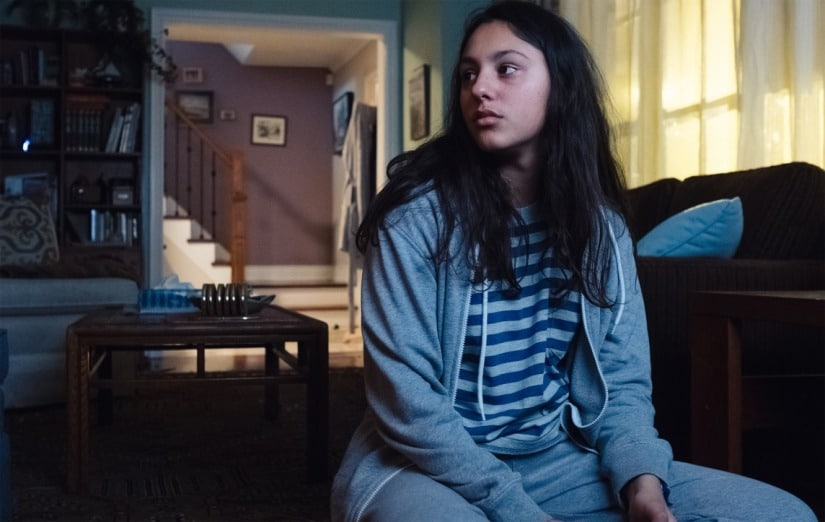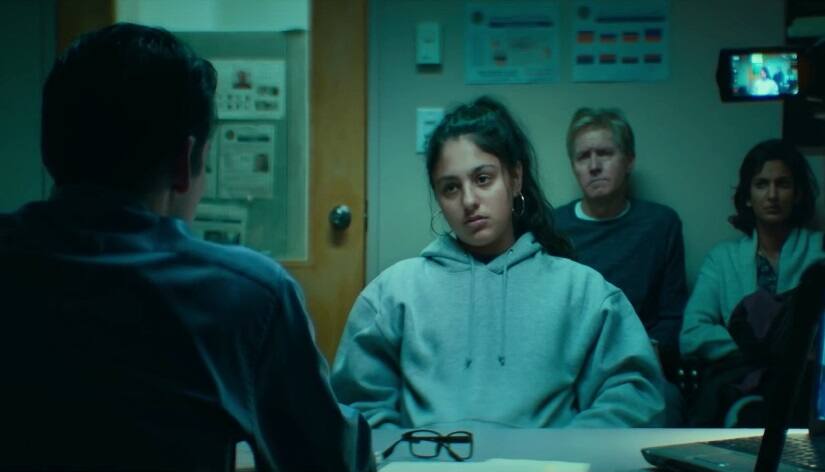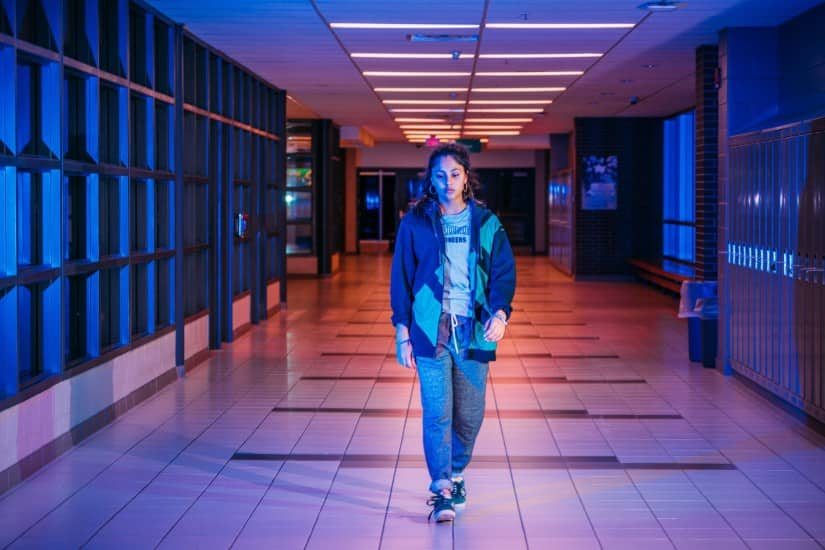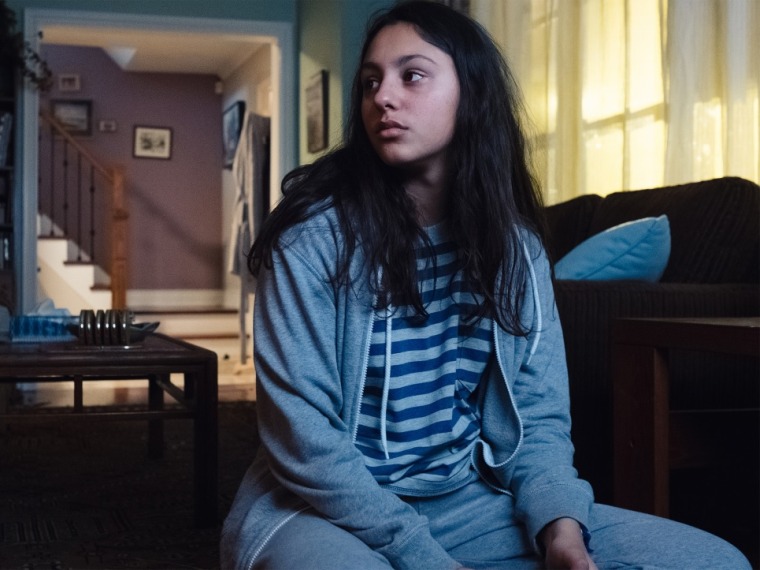Writer-director: Pippa Bianco Cast: Rhianne Barreto, Poorna Jagannathan, JC MacKenzie, Charlie Plummer, Nicholas Galitzine, Lovie Simone Rating: ★★★☆☆ [caption id=“attachment_7094621” align=“alignnone” width=“825”] Rhianne Barreto in a still from Share | HBO/A24[/caption] Smartphones have made it easy to record and distribute private sexual images without consent — all from the safety net of being anonymous and behind a screen. It is unsettling to think that one’s reputation can be damaged based on the whims and voyeuristic fancies of a mean-spirited prankster. Although it’s never the victim’s fault for having their privacy violated, they’re made to carry the burden of shame. In the new HBO film Share
, Pippa Bianco brings to light the painful process of recovering and healing from sexual assault in the digital age. Sixteen-year-old Mandy (Rhianne Barreto) wakes up face down in the grass on the front lawn of her house with no memory of how she got there and what transpired at the party the night before. On self-examination, she finds some troubling marks on her body — bruises on her back and abrasions on her arms — which add to the mystery. The nightmare continues the following day when her phone begins to blow up with messages of concern from her friends — U see it? The video? Is it u? U need to see it — as tension builds with escalating iMessage alert sounds. The video see her blackout drunk, lying face down on a bathroom floor, as she is groped by a male classmate while others laugh and record on the sidelines. Only she doesn’t know who’s doing the groping, who’s laughing and who’s recording due to the blurry and brief nature of the clip. The film loses a tremendous amount of steam quickly after its first act. Though Mandy is understandably shocked, there’s a passivity in her face throughout — when she confronts her male classmates, when her friends continue to hang out with possible perpetrators or even when the video is leaked to TV channels. On her parents’ insistence, she reluctantly pursues criminal charges but this only leads her on a trajectory of social isolation as she is ostracised by her classmates and community. But all Mandy cares about is the truth so that she knows whom she can and cannot trust. [caption id=“attachment_7094581” align=“alignnone” width=“825”]
Rhianne Barreto in a still from Share | HBO/A24[/caption] Smartphones have made it easy to record and distribute private sexual images without consent — all from the safety net of being anonymous and behind a screen. It is unsettling to think that one’s reputation can be damaged based on the whims and voyeuristic fancies of a mean-spirited prankster. Although it’s never the victim’s fault for having their privacy violated, they’re made to carry the burden of shame. In the new HBO film Share
, Pippa Bianco brings to light the painful process of recovering and healing from sexual assault in the digital age. Sixteen-year-old Mandy (Rhianne Barreto) wakes up face down in the grass on the front lawn of her house with no memory of how she got there and what transpired at the party the night before. On self-examination, she finds some troubling marks on her body — bruises on her back and abrasions on her arms — which add to the mystery. The nightmare continues the following day when her phone begins to blow up with messages of concern from her friends — U see it? The video? Is it u? U need to see it — as tension builds with escalating iMessage alert sounds. The video see her blackout drunk, lying face down on a bathroom floor, as she is groped by a male classmate while others laugh and record on the sidelines. Only she doesn’t know who’s doing the groping, who’s laughing and who’s recording due to the blurry and brief nature of the clip. The film loses a tremendous amount of steam quickly after its first act. Though Mandy is understandably shocked, there’s a passivity in her face throughout — when she confronts her male classmates, when her friends continue to hang out with possible perpetrators or even when the video is leaked to TV channels. On her parents’ insistence, she reluctantly pursues criminal charges but this only leads her on a trajectory of social isolation as she is ostracised by her classmates and community. But all Mandy cares about is the truth so that she knows whom she can and cannot trust. [caption id=“attachment_7094581” align=“alignnone” width=“825”] Mandy files a police report on her parents’ bidding | HBO/A24[/caption] Barreto internalises Mandy’s anger as she suffers quietly through it all, mostly reacting rather than acting to the unsavoury circumstances. Poorna Jagannathan offers a tender portrait of an ever-supportful mother, who wants justice for her daughter but soon realises reporting the assault may not have been the best decision. JC Mackenzie tries to balance his paternal empathy and precarious masculinity as a father coming to terms with his daughter’s sexual assault. Through Mandy, Bianco shows why many survivors refuse to go through the emotional burden of pursuing criminal charges against their perpetrators. To do so is likely to result in more humiliation, ostracism, and often threats. Though Mandy’s parents have nothing but good intentions, Mandy simply wants to uncover the truth so she can move on. But you wish Bianco focused more on the emotional turmoil and trauma experienced by a 16-year-old sexual assault survivor, rather than the mystery behind the video. Its strengths and faults lie in its pokerfaced objectivity, which doesn’t condescend to its teenaged protagonist but it doesn’t offer much psychological depth in its depiction of her journey towards recovery either. This is what made last year’s HBO drama, The Tale, a lot more compelling depiction of sexual abuse and the unreliability of memories. It was an exceptional cinematic exercise in remembering as Jennifer Fox separated the truth from the lies she was told and those she told herself. [caption id=“attachment_7094591” align=“alignnone” width=“825”]
Mandy files a police report on her parents’ bidding | HBO/A24[/caption] Barreto internalises Mandy’s anger as she suffers quietly through it all, mostly reacting rather than acting to the unsavoury circumstances. Poorna Jagannathan offers a tender portrait of an ever-supportful mother, who wants justice for her daughter but soon realises reporting the assault may not have been the best decision. JC Mackenzie tries to balance his paternal empathy and precarious masculinity as a father coming to terms with his daughter’s sexual assault. Through Mandy, Bianco shows why many survivors refuse to go through the emotional burden of pursuing criminal charges against their perpetrators. To do so is likely to result in more humiliation, ostracism, and often threats. Though Mandy’s parents have nothing but good intentions, Mandy simply wants to uncover the truth so she can move on. But you wish Bianco focused more on the emotional turmoil and trauma experienced by a 16-year-old sexual assault survivor, rather than the mystery behind the video. Its strengths and faults lie in its pokerfaced objectivity, which doesn’t condescend to its teenaged protagonist but it doesn’t offer much psychological depth in its depiction of her journey towards recovery either. This is what made last year’s HBO drama, The Tale, a lot more compelling depiction of sexual abuse and the unreliability of memories. It was an exceptional cinematic exercise in remembering as Jennifer Fox separated the truth from the lies she was told and those she told herself. [caption id=“attachment_7094591” align=“alignnone” width=“825”] Promo still from Share | HBO/A24[/caption] Though Bianco’s film is anything but a cautionary tale on teenagers indulging in sex, drugs and alcohol, it does single out ennui to be a chief cause of their indulgences. But there’s never any judgement. Even when Mandy confesses to her dad she started drinking and hooking up with people because she wanted to and liked it, he consoles her by reminding her that no matter how drunk or promiscuous she had been, it still doesn’t give them the right to do what they did to her. In a pandemic victim blaming culture, it is such a welcome sigh of relief to hear such words. It is shocking that young men think it is acceptable to share photos and videos of sexual assault, as if the Internet is exempt from civility. However, Bianco’s only real message is that the decision to turn a blind eye to such videos or to take action against the perpetrators should be left to the survivor alone. The strange direction it takes in the final act perhaps speaks to the impossibility of closure in cases of sexual assault, but it also feels contrived. The potential of Share’s timely and unsettling premise is thus never fully realised. Share
is now streaming on Hotstar.
Promo still from Share | HBO/A24[/caption] Though Bianco’s film is anything but a cautionary tale on teenagers indulging in sex, drugs and alcohol, it does single out ennui to be a chief cause of their indulgences. But there’s never any judgement. Even when Mandy confesses to her dad she started drinking and hooking up with people because she wanted to and liked it, he consoles her by reminding her that no matter how drunk or promiscuous she had been, it still doesn’t give them the right to do what they did to her. In a pandemic victim blaming culture, it is such a welcome sigh of relief to hear such words. It is shocking that young men think it is acceptable to share photos and videos of sexual assault, as if the Internet is exempt from civility. However, Bianco’s only real message is that the decision to turn a blind eye to such videos or to take action against the perpetrators should be left to the survivor alone. The strange direction it takes in the final act perhaps speaks to the impossibility of closure in cases of sexual assault, but it also feels contrived. The potential of Share’s timely and unsettling premise is thus never fully realised. Share
is now streaming on Hotstar.
Share movie review: HBO-A24 drama offers a chilling portrait of sexual assault in the smartphone age
Prahlad Srihari
• August 3, 2019, 12:28:19 IST
Pippa Bianco’s Share had its world premiere at the 2019 Sundance Film Festival and was also screened at Cannes earlier this year.
Advertisement
)
End of Article